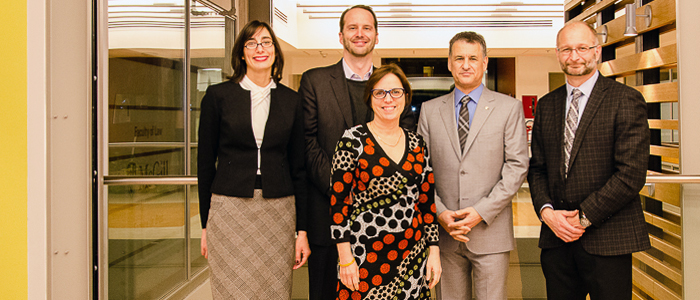
From left to right: Prof. Lara Khoury, Prof. Frédéric Bachand and Assistant Dean Véronique Bélanger (CLE organizers), Prof. Daniel Levitin and Prof. David Lametti
In conversation with Professor David Lametti, author and McGill professor of psychology Dan Levitin offers his thoughts on how information overload affects decision making. La professeure Lara Khoury présente les résultats préliminaires d’une recherche sur le traitement judiciaire de la preuve scientifique en France et au Québec.
The third installment of the 2014-2015 Continuing Legal Education (CLE) lecture series offered a look at the interactions between science and the law, with a lecture by McGill Psychology professor Daniel Levitin on the impact technology and modern culture have on the brain, as well as a lecture by Law professor Lara Khoury on how judges incorporate scientific and expert opinions into their court decisions.
Associate Dean Véronique Bélanger opened the evening by noting its truly interdisciplinary nature. “This is an approach that is more and more common in universities because it offers fresh perspectives to better understand an increasingly complex world,” she said. “We believe that as legal practitioners and legal educators we can also benefit from interdisciplinary inquiries and approaches.”
Levitin, whose most recent book is entitled The Organized Mind, explained during his talk that, in a world where it is increasingly critical that we be able to sift through information and prioritize and categorize it, lawyers—and librarians—have a distinct advantage.
Librarians, for example, are trained to separate digital wheat from digital chaff, Levitin said, adding that his impression was that “lawyers are very good at processing enormous amounts of information, pull out a point at a moment’s notice, and be able to anticipate, like a chess game, what the opposition might pull out.”
In the question and answer session that followed, Harvey Yarosky, BCL’61, asked Levitin about the effect of information overload on the quality of decisions we make.
“I was a student here between 1958 and 1961 and we talked then a lot about C.P. Snow’s two cultures,” Yarosky said. “Is there any research on how all this information we are overloaded with affects the quality of decisions made by policy makers around the world? In law and government, we talk about evidence-based decisions, but does neuroscience have anything to say about people’s ability to advance in decisions to do with science versus decisions to do with quality of life and our planet?”
“People have always made bad decisions but what has complicated matters in the information age and the information explosion is something neuroscientists have identified as decision fatigue,” Levitin answered. “Neural circuits need nutrients, largely glucose, brought to them by blood. And although your brain knows the difference between an important decision and an unimportant one, the metabolic cost is about the same. Making little decisions depletes those resources as rapidly as making important decisions.”
What’s more, he said, “it is very difficult to learn to make good decisions. We need to practice it because all kinds of biases creep into decision-making. The brain didn’t evolve to deal with the world in its complexity.”
Pour la deuxième partie de la conférence, la professeure Lara Khoury a présenté les résultats préliminaires d’une recherche entreprise en collaboration avec le Professeur Etienne Vergès de l’université Pierre-Mendès France, à Grenoble, sur le traitement judiciaire de la preuve scientifique en France et au Québec, dans le domaine de la responsabilité civile.
« La justice et la science appartiennent à deux mondes hermétique et on oppose ainsi la vérité scientifique et vérité judiciaire, » a expliqué la professeure Khoury. « Notre étude tentait de vérifier si cette opposition entre la science et le droit abordée dans la littérature correspond à la pratique. »
La professeure Khoury a noté certaines différences procédurales entre le droit québécois et le droit français, qui, de l’avis des chercheurs, explique certaines disparités notées dans l’étude.
« La France repose sur un modèle procédural qui est civiliste alors qu’au Québec, on a un modèle procédural mixed, inspiré par le droit civil et la common law. Ceci entraine des différences assez majeures dans le traitement de la preuve scientifique. »
Par exemple, l’expert judiciaire en France est nommé par le juge et considéré comme impartial alors que l’expert au Québec est choisi par les parties parce qu’il défend leur thèse.
Les résultats préliminaires de l’analyse d’un échantillon de jugements français et québécois rendus entre 2008 à 2013 démontre que les juges adoptent des attitudes très différentes à l’égard de la preuve scientifique. Certains juges refusent complètement de s’immiscer dans le débat scientifique, alors que d’autres vont jusqu’à adopter un raisonnement scientifique et entrer dans la controverse, essayant même parfois de trancher le débat scientifique.
La prochaine conférence de la série Une pensée d’avance / Think Ahead aura lieu le mardi, 24 février. Les professeurs Rosalie Jukier, Pierre Jobin et Stephen Smith (McGill) et la professeure Michelle Cumyn (U. Laval) discuteront la bonne foi dans les relations contractuelles.
[ JUMP TO THE CURRENT EDITION OF FOCUS ONLINE ]
